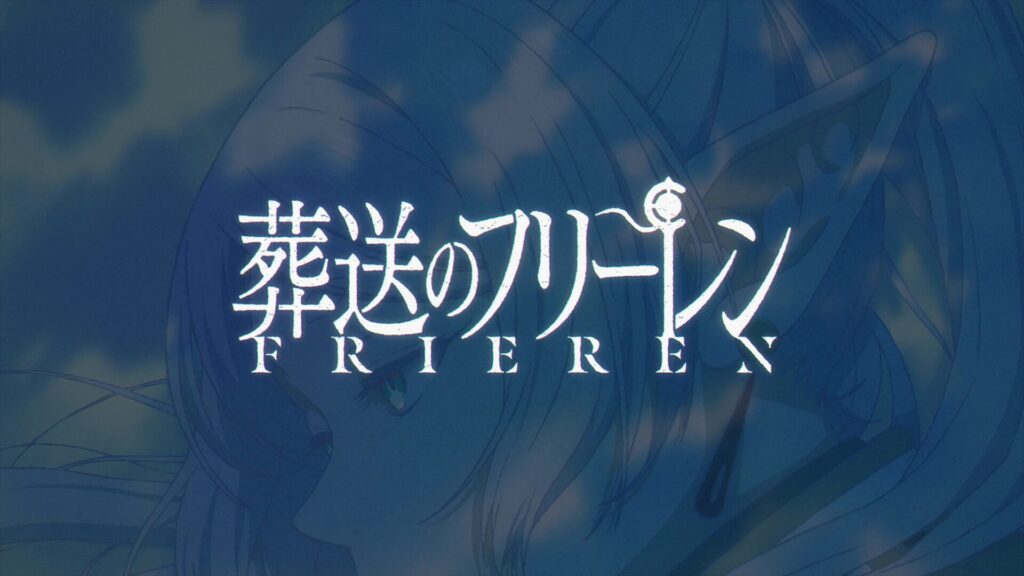
🟦 『Frieren: Beyond Journey’s End』Episode 4 – Sunrise Promises : 夜明(よあ)けに ちかった やくそく
この むらでは しんねんさいの ひに ひのでを みる しゅうかんが あります。
In this village, it’s customary to watch the sunrise on New Year’s Day.
ひかりが すきとおる うみに はんしゃして、とても きれいなのだそうです。
They say the light reflects on the clear water, and it’s very beautiful.
ふりーれんさまは、それを みたことが ありません。
Mistress Frieren has never seen it before.
いつも ねぼう して まにあわないのです。
She always oversleeps and misses it.
こんかいこそは と、ふぇるんは おこそうと します。
This time, Fern is determined to wake her up.
ふりーれんさまは、「きょうみは ない」と いいながら、どこか たのしみに しているようでした。
Though Frieren says she isn’t interested, she seems to be looking forward to it in her own way.
🌟 Scene Vocabulary
こんかい(今回) /kon.kai/ – Noun
Meaning: This time; this occasion
ねぼう(寝坊) /ne.bou/ – Noun/Verb
Meaning: Oversleeping; sleeping in
しゅうかん(習慣) /shuu.kan/ – Noun
Meaning: Custom; habit
はんしゃ(反射) /han.sha/ – Noun
Meaning: Reflection (of light, etc.)
たのしみ(楽しみ) /ta.no.shi.mi/ – Noun
Meaning: Looking forward to; pleasure
まにあう(間に合う) /ma.ni.a.u/ – Verb
Meaning: To be in time; to make it
💬 Quote #1 – Tell Him Yourself
30年前のあの日、お前はヒンメルを知っておけばと口にした。あの言葉、ヒンメルに直接伝えてやるべきものだ。大魔法使いフランメの手記には、死者と対話したという記録が残っているとされている。
30 years ago, at his funeral, you said that you wished you would have gotten to know him better. In my humble opinion, you should tell that to Himmel himself. According to legend, Flamme’s notes discuss her conversations with the dead and how she achieved those meetings.
さんじゅうねんまえの あのひ、 おまえは ひんめるを しっておけば と くちに した。
その ことばは、 ひんめるに ちょくせつ つたえて やるべき もの だ。
だいまほうつかい ふらんめの しゅきには、 ししゃと たいわ した という きろくが のこっている と されている。
sanjuunen mae no ano hi, omae wa Hinmeru o shitte okeba to kuchi ni shita.
sono kotoba wa, Hinmeru ni chokusetsu tsutaete yaru beki mono da.
dai mahou tsukai Furanme no shuki ni wa, shisha to taiwa shita to iu kiroku ga nokotte iru to sarete iru.
🌟 Waku Waku Word Dive
● しゅき(手記) /shu.ki/ – Noun
Meaning: Memoirs; written notes (especially by a person of importance)
● ししゃ(死者) /shi.sha/ – Noun
Meaning: The deceased; dead person
● たいわ(対話) /tai.wa/ – Noun
Meaning: Dialogue; conversation
● ちょくせつ(直接) /cho.ku.setsu/ – Adverb
Meaning: Directly
● のこる(残る) /no.ko.ru/ – Verb
Meaning: To remain; to be left
● つたえる(伝える) /tsu.ta.e.ru/ – Verb
Meaning: To convey; to communicate
📘 Mini Grammar Boost
~おけばと口にした
Ex: 知っておけば と 口に した
Tip: “(you) said you wish you had known” – expresses spoken regret or hypothetical reflection
~べきものだ
Ex: 伝えてやるべき もの だ
Tip: “should do” – expresses strong moral or logical obligation
~とされている
Ex: 記録が 残っている と されている
Tip: “it is said that…” – used for reported information or common belief
🔀 Slash Reading – Japanese / English
30年前の あの日、 お前は ヒンメルを 知っておけば と 口にした。
30 years ago, at his funeral, you said you wished you had known Himmel better.
その 言葉は、 ヒンメルに 直接 伝えて やるべき ものだ。
That’s something you should tell him yourself.
大魔法使い フランメの 手記には、 死者と 対話 したという 記録が 残っていると されている。
It’s said that Flamme’s notes describe conversations with the dead.
💬 Quote #2 – Not Your Mom, You Know
フリーレン様って、もしかしてすごくだらしがない人なのでしょうか。毎朝フリーレン様のことを起こして、ご飯食べさせて、服着せて。これ私、完全にお母さんですよね。
I wonder if you might actually be a rather irresponsible sort of person. I wake you up at a reasonable hour every morning, then get you dressed and feed you. You do know, that I am not your mother, don’t you?
ふりーれんさまって、 もしかして すごく だらしがない ひと なのでしょうか。
まいあさ ふりーれんさまの ことを おこして、 ごはん たべさせて、 ふく きせて。
これ わたし、 かんぜんに おかあさん ですよね。
Furīren-sama tte, moshikashite sugoku darashigai nai hito na no deshou ka.
mai asa Furīren-sama no koto o okoshite, gohan tabesasete, fuku kisete.
kore watashi, kanzen ni okaasan desu yo ne.
🌟 Waku Waku Word Dive
● だらしがない /da.ra.shi.ga.na.i/ – Adjective
Meaning: Sloppy; undisciplined
● おこす(起こす) /o.ko.su/ – Verb
Meaning: To wake someone up
● たべさせる(食べさせる) /ta.be.sa.se.ru/ – Verb
Meaning: To make/let someone eat; to feed
● きせる(着せる) /ki.se.ru/ – Verb
Meaning: To dress someone; to put clothes on someone
● おかあさん(お母さん) /o.kaa.san/ – Noun
Meaning: Mother; mom
● かんぜんに(完全に) /kan.zen.ni/ – Adverb
Meaning: Completely; totally
📘 Mini Grammar Boost
~かもしれません / ~のでしょうか
Ex: すごく だらしがない 人 なのでしょうか
Tip: Polite speculation – “I wonder if…” or “Could it be that…”
~させて
Ex: ご飯 食べさせて、服 着せて
Tip: Causative form – “make/let someone do X”
~これ~ですよね
Ex: これ 私、完全に お母さん ですよね
Tip: Colloquial confirmation – “I’m basically [X], right?”
🔀 Slash Reading – Japanese / English
フリーレン様って、 もしかして すごく だらしがない 人 なのでしょうか。
I wonder if you might actually be a rather irresponsible sort of person.
毎朝 フリーレン様の ことを 起こして、 ご飯 食べさせて、 服 着せて。
I wake you up at a reasonable hour every morning, then get you dressed and feed you.
これ 私、 完全に お母さん ですよね。
You do know, that I am not your mother, don’t you?
💬 Quote #3 – No Sleep Until Sunrise
正気ですかフリーレン様、太陽が昇る前に起きるんですよ。不可能でございます。徹夜するから大丈夫だよ。そこまでして日の出が見たいのですか?正直興味はないよ。だから見て確かめるんだ。
Have you lost your mind? That’s so early. There’s no way you’ll be able to wake up in time. It would be impossible. Not if I simply don’t sleep. You’re that intent on seeing the sunrise? To be honest, I couldn’t care less. That’s the reason I’d like to see it.
しょうき ですか ふりーれんさま、 たいようが のぼる まえに おきるん ですよ。
ふかのう で ございます。
てつや するから だいじょうぶ だよ。
そこまで して ひのでが みたいの ですか?
しょうじき きょうみは ない よ。
だから みて たしかめるん だ。
shouki desu ka Furīren-sama, taiyō ga noboru mae ni okirun desu yo.
fukanou de gozaimasu.
tetsuya suru kara daijoubu da yo.
soko made shite hinode ga mitai no desu ka?
shoujiki kyoumi wa nai yo.
dakara mite tashikamerun da.
🌟 Waku Waku Word Dive
● しょうき(正気) /shou.ki/ – Noun
Meaning: Sanity; sound mind
● ふかのう(不可能) /fu.ka.nou/ – Noun
Meaning: Impossible
● てつや(徹夜) /te.tsu.ya/ – Noun
Meaning: Staying up all night
● ひので(日の出) /hi.no.de/ – Noun
Meaning: Sunrise
● きょうみ(興味) /kyou.mi/ – Noun
Meaning: Interest
● たしかめる(確かめる) /ta.shi.ka.me.ru/ – Verb
Meaning: To check; to confirm
📘 Mini Grammar Boost
~まえに
Ex: 太陽が 昇る 前に 起きる
Tip: “Before [doing something]” – used to describe sequence
~から大丈夫
Ex: 徹夜する から 大丈夫 だよ
Tip: “[Because of X], it will be fine” – used to justify an action
~してまで
Ex: そこまでして 日の出が 見たい のですか?
Tip: “To go that far just to…” – expresses surprise at strong intent
~だから~んだ
Ex: だから 見て 確かめるん だ
Tip: “That’s why I’ll do it” – explanation with soft emphasis
🔀 Slash Reading – Japanese / English
正気 ですか フリーレン様、 太陽が 昇る 前に 起きるん ですよ。
Have you lost your mind? That’s so early.
不可能 で ございます。
There’s no way you’ll be able to wake up in time.
徹夜 するから 大丈夫 だよ。
Not if I simply don’t sleep.
そこまで して 日の出が 見たいの ですか?
You’re that intent on seeing the sunrise?
正直 興味は ない よ。
To be honest, I couldn’t care less.
だから 見て 確かめるん だ。
That’s the reason I’d like to see it.
Quote #4 – She’s Scary When She’s Mad
でもフェルンが嫌がるから早めに終わらせようか。なるべく効率的に探しましょう。変わったな。お前は人の時間を気にするような奴じゃなかった。だってフェルン、怒ると怖いんだよ。
But Fern doesn’t like when I work leisurely, so I’ll try to be quick. Let’s search as efficiently as possible. You’ve changed. You never cared about other people’s time before. That’s all Fern. She’s scary when she’s mad.
でも ふぇるんが いやがる から はやめに おわらせようか
なるべく こうりつてきに さがしましょう
かわった な
おまえは ひとの じかんを きにする ような やつ じゃなかった
だって ふぇるん、 おこると こわいんだよ
demo Ferun ga iyagaru kara hayame ni owaraseyou ka
narubeku kouritsuteki ni sagashimashou
kawatta na
omae wa hito no jikan o ki ni suru you na yatsu janakatta
datte Ferun, okoru to kowai n da yo
🌟 Waku Waku Word Dive
● いやがる(嫌がる) /i.ya.ga.ru/ – Verb
Meaning: To dislike; to be unwilling
● はやめに(早めに) /ha.ya.me.ni/ – Adverb
Meaning: A little earlier; ahead of time
● こうりつてき(効率的) /kou.ri.tsu.te.ki/ – Adjective
Meaning: Efficient; effective
● かわる(変わる) /ka.wa.ru/ – Verb
Meaning: To change; to transform
● じかん(時間) /ji.ka.n/ – Noun
Meaning: Time
● おこる(怒る) /o.ko.ru/ – Verb
Meaning: To get angry
📘 Mini Grammar Boost
~から [action]
Ex: フェルンが 嫌がる から 早めに 終わらせようか
Tip: “Because [reason], let’s [do something]” – explains motivation for action
~ような [noun]
Ex: 人の 時間を 気にする ような 奴
Tip: “The kind of person who…” – used to describe type or tendency
~と [emotion]
Ex: 怒る と 怖いんだよ
Tip: “When [someone] does X, [Y happens]” – expresses cause and effect
🔀 Slash Reading – Japanese / English
でも ふぇるんが いやがる から はやめに おわらせようか
But Fern doesn’t like when I work leisurely, so I’ll try to be quick.
なるべく こうりつてきに さがしましょう
Let’s search as efficiently as possible.
かわった な
You’ve changed.
おまえは ひとの じかんを きにする ような やつ じゃなかった
You never cared about other people’s time before.
だって ふぇるん、 おこると こわいんだよ
That’s all Fern. She’s scary when she’s mad.
Quote #5 – A Message Meant for Himmel
お前とヒンメルがかわいそうだと思ったんだ。30年前のあの日、お前はヒンメルを知っておけばと口にした。あの言葉、ヒンメルに直接伝えてやるべきものだ。大魔法使いフランメの手記には、死者と対話したという記録が残っているとされている。
Not just you, I suppose. I felt sorry for Himmel, too. 30 years ago, at his funeral, you said that you wished you would have gotten to know him better. In my humble opinion, you should tell that to Himmel himself. According to legend, Flamme’s notes discuss her conversations with the dead and how she achieved those meetings.
おまえと ひんめるが かわいそう だと おもったんだ
さんじゅうねんまえの あのひ、 おまえは ひんめるを しって おけば と くちに した
あの ことば、 ひんめるに ちょくせつ つたえて やるべき もの だ
だいまほうつかい ふらんめの しゅきには、 ししゃと たいわ した という きろくが のこっている と されている
omae to Hinmeru ga kawaisou da to omottan da
sanjuu nen mae no ano hi, omae wa Hinmeru o shitte okeba to kuchi ni shita
ano kotoba, Hinmeru ni chokusetsu tsutaete yaru beki mono da
daimahoutsukai Furamme no shuki ni wa, shisha to taiwa shita to iu kiroku ga nokotte iru to sarete iru
🌟 Waku Waku Word Dive
● かわいそう /ka.wa.i.so.u/ – Adjective
Meaning: Pitiful; poor (someone)
● ちょくせつ(直接) /cho.ku.se.tsu/ – Adverb
Meaning: Directly; in person
● つたえる(伝える) /tsu.ta.e.ru/ – Verb
Meaning: To convey; to tell
● ししゃ(死者) /shi.sha/ – Noun
Meaning: The dead; deceased person
● たいわ(対話) /tai.wa/ – Noun
Meaning: Dialogue; conversation
● きろく(記録) /ki.ro.ku/ – Noun
Meaning: Record; documentation
📘 Mini Grammar Boost
~と口にした
Ex: ヒンメルを 知って おけば と 口にした
Tip: “Said aloud that…” – expresses something that was said directly
~べき
Ex: 伝えて やるべき もの
Tip: “Should do X” – used to express obligation or recommendation
~とされている
Ex: 対話した という 記録が 残っている と されている
Tip: “It is said that…” – indicates general belief or assumption
🔀 Slash Reading – Japanese / English
おまえと ヒンメルが かわいそう だと おもったんだ
Not just you, I suppose. I felt sorry for Himmel, too.
三十年前の あの日、 おまえは ヒンメルを 知って おけば と 口にした
30 years ago, at his funeral, you said that you wished you would have gotten to know him better.
あの 言葉、 ヒンメルに 直接 伝えて やるべき もの だ
In my humble opinion, you should tell that to Himmel himself.
大魔法使い フランメの 手記には、 死者と 対話した という 記録が 残っている と されている
According to legend, Flamme’s notes discuss her conversations with the dead and how she achieved those meetings.


